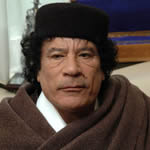Whither the Arab world?

it watches the unprecedented events unfolding in the Arab world.
It started with Tunisia, then Egypt, spreading to Yemen, Algeria, Bahrain and Libya.
Some call it a revolution whilst others call it an uprising, an upheaval or an expression of “people’s power”.
Whatever is the most appropriate term, the events taking place in the Middle East are dramatic and have left punters at a loss to predict the outcomes. There is no doubt that these events will have far-reaching effects on the balance of power in world affairs. The IPCM takes stock of these events and puts them into perspective.
Common Factors
Readers will note that the current wave of protests sweeping across the Middle East has common factors. The first factor is that the countries concerned are Arabic and the governments have strong partnerships with the West, rather than China or Russia. The second factor is that the countries have impressive GDPs but some of their citizens live in extreme poverty.
The unemployed graduate who burnt himself and sparked the uprising in Tunisia demonstrates this point. Another common factor is that the political systems in those countries had limited democratic space to the extent that in some cases the opposition had no discernible structures nor leadership. Contrast this to Zimbabwean or Sadc environment.
In Egypt, for example, the voice of the Muslim Brotherhood had been muzzled for decades and is only finding expression in the post-Mubarak period. The same applies to Libya and also to Bahrain where the majority has been ruled by a royal minority. In each of the countries concerned, the West was working well with the respective governments and reaping large economic benefits. Bahrain, for example, hosts the Fifth Fleet of the US Navy, and is likely to be hosting strategic missile systems as well. The Bahrain Grand Prix that is hosted annually in March is a toast of the West but the 2011 edition had to be cancelled due to the current situation.
Betrayal
It is remarkable that the West has distanced itself from the respective regimes as soon as trouble knocked on the doorstep. Prior to this, the regimes had not suffered any domination by the West, unlike the case with Zimbabwe.
For Mubarak, this must have been the greatest betrayal since he had upheld the interests of the US and Israel for his entire reign, particularly through the Camp David Accords. Right now Iranian navy vessels are cruising through the Suez Canal, courtesy of the new government in Egypt.
Mubarak’s assets have been frozen in Switzerland and elsewhere, yet they were previously dutifully kept by the West until the uprising. In his recent newsletter on Egypt, Comrade Castro says “when the Egyptian people were awaiting explanations from the government of their own country, the answers were coming from senior officials of the United States intelligence or government bodies, without any respect for Egyptian officials”.
It is the hypocrisy of Europe and America that is remarkable, that the same good leader instantly becomes a villain. Leaders in Africa and the developing countries must take note of the serious hazard here.
Mobocracy Acceptable
The uprisings were hailed by the West as an expression of “people’s power”. Take note dear reader that the West does not condone coups, regardless of their popularity. However, they are condoning mobocracy, or mob rule.
The thesis is difficult to comprehend; a coup is not acceptable but mobocracy is acceptable. Both methods are unconstitutional but Western logic is accepting one but not the other.
It can only mean that mobocracy is considered acceptable for the lesser people of the developing world since Europe and America will not brook any such chaos.
Enter the Freemasons.
The hidden hand of the Freemasons is evident in all this drama, hatching the plot and manipulating any popular sentiment.
These sentiments revolve around poverty, sectarianism, anti-imperialism, the desire for liberal Western lifestyles and political and social freedoms.
Gaddafi in his televised address on the crisis in Libya claims that the protesters want to establish an Islamic state in Libya and warns that instability in Libya will create a haven for Al Qaeda. Who knows?
The West does not mind authoritarian rule as long as their interests in a host country are protected.
Latin America is full of examples; Noriega, Pinochet and others. The list extends to Saddam Hussein, Mobutu Sese Seko, Jonas Savimbi and Bin Laden himself.
The Freemasons are welcoming the wave of protests sweeping across the Arab world, hoping that it would weaken Islam. However, there is a big possibility that the wave of protests is driven more by nationalism and anti-imperialism rather than sectarianism or the desire for liberalised lifestyles. Ayatollah Khamenei, the spiritual leader of Iran, is quoted by Press TV warning the Islamic clerics to be wary of the US “hijacking” the current protests in the Arab world. In other words, he believes that the protests are not driven by the West, neither are they pro-West.
Russia and China
The question as to why the West has enjoyed stronger ties with the Arab world compared to Russia and China is pertinent. With the exception of Nasser’s Egypt, Gaddafi in a way, Iran, Syria and Lebanon, the majority of the Arab League countries have strong ties with the West, despite the Israeli-Palestinian issue. This situation is rather paradoxical and differs from the situation in Southern Africa whereby the liberation movements received support notably from Russia and China and not the West. The answer to this paradox would shed light as to which way the current protests are leading.
Zimbabwe
Some have savoured the idea of an uprising in Zimbabwe based on the period that the President has served, ignoring the basket of other factors at play. An analysis of the factors at play indicates how catastrophic an uprising in Zimbabwe would be. In Uganda, as the drama was unfolding in the Middle East, Yoweri Museveni was getting a further five years on top of his 25-year rule.
Conclusion
It stands to be seen which of the basket of factors attributable to the wave of protests sweeping across the Arab world are dominant.
Essentially, whether the protests will eventually carry Western interests or ant-imperial sentiment is a matter of conjecture.
The West has no big reason to cheer for now since regimes that are friendly regimes have been either toppled or are under threat. The prospect of Western democracy taking root across the Middle East is cherished by the West.
However, a word of caution, the new governments may be highly nationalistic if not downright ant-imperialistic.
Chakanyuka Karase is the chairman of the Institute for Peace and Conflict Management.










Comments